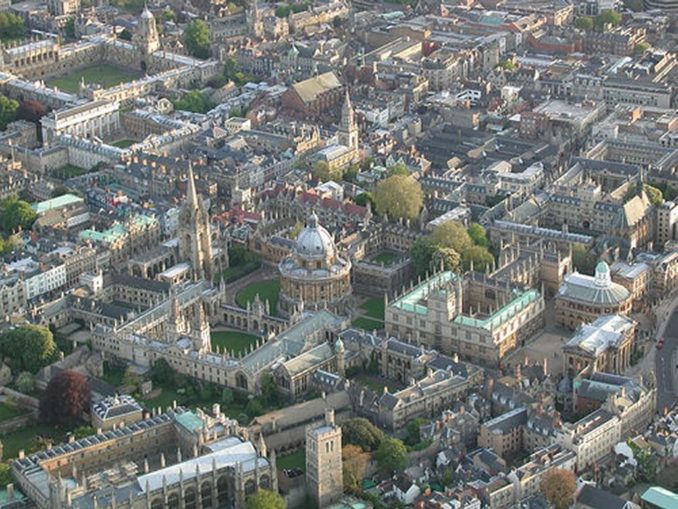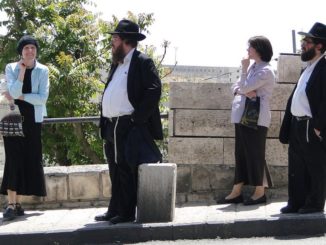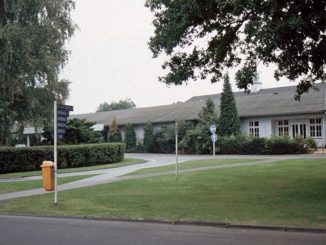
SirMetal, Public domain, via Wikimedia Commons
Chapter 31 – The Detective’s story
Detective Inspector Charles Hope made his way up to the Major Investigation Team’s offices, on the second floor of the Headquarters of the Thames Valley Police at Kidlington in Oxford. He was fifty-three, overweight and was currently suffering from an infected in-growing toenail and gout. He took the stairs rather than the lift, because his doctor told him he needed to take more exercise. It wasn’t couched in advisory terms, but a clear directive. You are to take more exercise, improve your diet and importantly, most importantly, you will stop smoking.
DI Hope had served in the police force for thirty-two years. He had started in the City of London Police, then the Met and finally the Thames Valley Police. He had applied to leave the Met because he found himself policing a Capital City he no longer understood, identified with and which felt like a foreign country to him. He had been staving off the inevitable. Parts of the Thames Valley area had more in common with the Indian Sub-Continent than the leafy shires. Hope was enduring the few remaining years for his pension. He loathed his job, the majority of his peers and virtually all of his superiors. The mild exertion of two flights of stairs had caused acid reflux, not helped by the nicotine gum he now habitually chewed.
It was 08:45 and he was late. The traffic from Chinnor, where Hope lived with his wife and recently estranged son, had been its usual, horrendously gridlocked self. It was the slow crawl towards the Headington roundabout on the A40 that caused him the deepest joy. He was convinced that he would have done a Michael Douglas, a la Falling Down, if it hadn’t been for audio books. Hope was currently enjoying: RAF Police: The Great Escape Murders by Stephen R Davies. As he stared at the exhausts of assorted 4 X 4s he was lost in the story of how the RAF Police had hunted down members of the Gestapo and SS who had murdered fifty of the Stalag Luft Three escapees. To him, that had been proper policing. A single-minded determination to bring criminals to justice and see them paying for their crimes, by having their T-vertebrae twisted and broken at the end of Albert Pierrepoint’s nooses. As opposed the tedious and ultimately futile social work that was modern policing.
How times had changed from his Nick at Harlesden back in the mid-eighties. There had been swing doors with heavy, interior paned glass. Brass lock plates that were polished by cleaners who actually gave a toss. If people in custody soiled their cells, they were given a mop, bucket and disinfectant and told to clean it up. Now a bodily fluids hazmat team would isolate the area, clean it and bill the station for thousands. Coppers had been generally polite to non-form members of the general public, whom they policed by consent. Policing was by the needs of the local area, rather than tick-box directives from the Home Office. Hope jarred his right foot on the top stair and his big toe shrieked in protest.
“Fukit!”
The Major Investigation Team was already assembled and coming to the end of the morning briefing, when Hope rolled into the room. He raised his hand in apology to the female DCI who was heading up the case. She briefly glowered at him, being put off her stride. Hope went to ground at the back of the room and listened to her oh-so-well-enunciated morning prayers. He had to admit, DCI Parry was beautifully well-spoken and the youngsters on the team were hanging on her every word. She had a BA in politics and sociology, was destined for the top and good luck to her.
One thing Hope did like about modern policing was the enormous power of the IT systems. They had a huge, interactive whiteboard for doing something called “brain dumps,” and the results of their diagrams could be printed off. Apparently “brainstorming” was deemed to be possibly offensive to persons suffering from epilepsy and it was vitally important to avoid offending anyone, as he was to find out. Databases were much quicker the old cardex systems he had cut his detecting police work on. But he did sense that computer-based policing did make the teams overly reliant on technology and he was constantly losing his nine letter, randomly generated passwords, which he wrote on scraps of paper despite knowing that was not good data protection.
It was clear to Hope as the morning prayers drew to a close, that despite all the technology, databases and interactive smartboards, they were no closer to finding out who had blown apart Mr Ronald Gleam’s head with a one hundred-and-forty-five grain .308 round. But what angered the police the most, was the fact whoever had murdered Mr Gleam had also severely wounded two members of their tactical firearm unit and a member of the air support unit. Not to mention the damage to the Thames Valley Service’s Eurocopter and a BBC outside broadcast van.
They had a list of suspects as long as all of their arms put together and they were all members of Her Majesty’s Armed Forces who were being investigated for war crimes by Mr Gleam’s firm Community Legal Notaries. Therefore most of them possessed the means and motive to kill Mr Gleam and quite frankly, he wouldn’t have blamed them. However, shooting at coppers was a different matter altogether.
Another complication was they had absolutely no forensic evidence, despite scouring the meadows and gardens around the shooting incidents. No DNA, no empty rounds and not even a footprint. A few days previously, they had a witness who had seen the shooter at close quarters in her back garden. The police sent a team of detectives and a police artist round to the lady’s lovely house on the river. It soon became clear to them that this lovely mummy was a bit of a trophy wife for some young, city thruster.
“I never really got a good look at his face, but I’ll never forget that evil stare,” she told them.
The detectives questioned her for over an hour and left, hoping that the police artist could make some headway. Diligently, he returned to the very lifelike drawing to DCI Parry in the incident room. She looked at it and then at the artist.
“This is exactly how that lady described him to me.”
“Is this some kind of a bloody joke?” she choked.
“I’m quite pleased with it and the lady said it was very accurate. She said he looked just like that.”
“Oh dear God,” DCI Parry said and put her head in her hands.
The artist’s impression of the shooter was put up on the wall of the incident room and still continued to cause chortles from visitors.
Hope had helpfully suggested that he might decide to pop out for takeaway or nip down the supermarket dressed like that and then they would have him bang to rights. It was comments like that that didn’t endear him to his more ambitious colleagues. And the day wore on, a list of trying to track down the over thirty suspects out of the two hundred who had no alibi and then arrange to interview them.
“Have you ever considered it may have been the Israelis who did away with Gleam?” Hope said at tea break.
They looked at him with incredulity.
“Think about it. Old Ron Gleam had fingered the Israelis for war crimes committed in Gaza. And the way the hit was carried out. Professional, no forensic, no gun, no empty cases and in the end he just disappears into thin air.”
“For God’s sake, Charles.”
“Well he wasn’t exactly popular, our Ron, was he?” Hope observed, chewing on yet another piece of nicotine gum. He picked up a file and began to thumb through it, “Unless you’re a subscriber to the Guardian. Could it have been the RAF Harrier pilot who killed the newly-married couple, who just happened to be travelling in the back of the Taliban tour bus? Or the Royal Marine who shot the child, (who was actually seventeen), who just happened to be wearing a suicide vest? Or this walking horseman of the apocalypse who shot a totally innocent bomb maker from half-a-mile and monstrously failed to issue a verbal warning?”
“I think it is him, It’s Edge. He has form.” A female DS opined, “And what’s wrong with the Guardian?”
“Reading the Guardian is one of the more popular ways, to show everyone in your nice, suburban development that you are really a rebel at heart, while talking on your new iPhone at Starbucks, wearing a Che Guevara shirt. Call me cynical, but I seriously doubt that those advertising their allegiance to “Che” know much about the sadistic Argentine Marxist revolutionary and what a truly awful shit he was. And there’s just one little flaw in your theory. Just one snag. Former Staff Sergeant Edge hasn’t been seen since December last year.”
“Well who do you think it was?” the deeply offended DS demanded of him, because she did talk on her iPhone in Starbucks.
“Two people on our suspect list have disappeared, both known to each other and serving on the same unit, the SAS. Sniper teams operate in pairs. This guy Edge could have pulled the trigger, but I’ll bet that former Warrant Officer Morrison had something to do with it.”
He headed for the door.
“Where the hell are you going?”
“I’m making a conscious effort to kill myself with a real cigarette, after all this nicotine gum.”
“We should be so lucky,” someone muttered.
* * *
Superintendent Allen looked at the official complaint file on his desk and sighed. He spun his chair round and looked across at the Elsavier building in the landscaped grounds. Allen wished he had a more dynamic name like, Chisholm, Gideon or even Reagan. Allen had seen enough re-runs of The Sweeny to know that it bore as much resemblance to modern policing as Thunderbirds did to space travel. He contemplated his latest bête noire encapsulated in the file in front of him.
Detective Inspector Charles Hope was an anachronism from a time of simpler policing by consent. He probably thought The Sweeny was a documentary, and still called his DCI “Guv,” an expression Amanda Parry hated. Once Hope had been a good, promising copper, but he had failed to move with the times. He was technophobic, had an attitude that could on occasions be described as “challenging” and he was widely held in contempt by some of his colleagues, who referred to him as “Forlorn Hope.” His “hunches” of which he was quite proud, would seldom fly and the DPP required more than a hunch from an anachronistic copper from the eighties, to successfully complete a prosecution. Superintendent Allen thought long and hard then decided. He sent an e-mail before he realised that Hope would probably not read it. He phoned the Major Investigation Team’s offices and left a message.
There was a post-it note waiting on his computer screen when Hope returned. The computer may have been on but it wasn’t logged in. Puzzled. Hope made his way to the sainted top floor and smiled nervously at Allen’s personal assistant.
“I think Super wants to see me.”
“Just go straight in, DI Hope.”
Superintendent Allen smiled as Hope came in, a smile that was somewhat lacking in warmth, “Hello, Charles. Please sit down. Can I get you anything?”
“No thanks, Sir.”
“Charles, I don’t believe in beating around the bush with an old sweat such as yourself.”
Hope felt reflux burn the bottom of his esophagus, wishing he hadn’t have cadged that cigarette from the delivery driver in the smoking shelter. He knew this wouldn’t be good and wondered what he had done wrong this time. Where to start?
“Charles, I’m sorry to say that I have received an official complaint, regarding something you said last week…”
“Sir that toe rag was being arsey. I know their law firm is going tits-up, but that guy was just being obstructive and…”
“Just stop there Charles. This is nothing to do with what you may or may not have said to a member of the Community Legal Notaries. This complaint comes from one of your colleagues based here.”
Hope sighed, “Here we go.”
“DI Hope, I have to ask you this question. When asked by a colleague whether you will be attending the Oxford Pride Parade in June, did you say: ‘Only when the Chief Constable attends, wearing a pair of arseless chaps?’”
“I may have done, but I said it to Terry Rawlings. There’s no way he would have put in a complaint against me.”
“Charles, that’s not how it works as you well know. Even if someone overhears what you say and finds it to be offensive, then that is grounds for a complaint. Your ill-advised comment to DI Rawlings was deemed to be homophobic, hence the complaint.”
“Sir, that is just bloody pathetic.”
“Please just listen, DI Hope. In addition, did you call DS Parkin ‘a pathetic bloody snowflake’ this Monday in the Major Incident Team Room? Under guidance issued last year in a departmental memo, the terms: ‘Snowflake’ and ‘Millennials’ are deemed to be offensive.”
“Sir this is complete, trivial nonsense.”
“I’m afraid that it isn’t, DI Hope. An official complaint has been made by one person and whilst she is unhappy at being called a ‘Snowflake.’ DS Parkin is happy for me to deal with the matter unofficially. Nevertheless, the official complaint stands and will need to be investigated.”
Superintendent Allen looked at the crestfallen Hope and felt torn. It was probably too late for him to ever make a good, modern copper and with the number of years he had left and with an official complaint against him, promotion was out of the question. Allen did have a soft spot for poor old DI Hope. He was like a dinosaur that couldn’t adapt to the Common Purpose and PC comet that thundered down into the Home Office. He happened to think that official police participation in Gay Pride events was a criminal waste of police resources and had chuckled out loud when he read the complaint. He happened to think that DS Parkin was a waste of bloody space, but DCI Parry really liked her, so she had a golden ticket.
Poor old blundering, blunt and tactless Charles Hope, had no idea of the forces of right-on righteous indignation fielded against him. It was now up to Allen to do the right thing and save Hope’s job and pension. He had to be moved somewhere while the investigation was conducted, receive his reprimand and moved away from this nest of vipers.
“OK, Charles. This is what we’re going to do. The current investigation you’re on is stalled until we can properly interview all the Service personnel on Gleam’s list. We’re going to have to liaise with the MoD and Service police, but that’s well in the future. We’re going to move you to Banbury to help with the investigation of those two murdered taxi drivers. They’re a bit short of manpower over at Banbury nick, so we’ve offered you up to help them. It’ll bring a fresh approach to another stalled investigation.”
“You’re getting me out of the way,” Hope said bitterly.
“Yes, Charles, frankly I am. You may not see it, but I’m doing you a favour, because you’ve upset members of your investigation team and you have lost DCI Parry’s confidence,” He didn’t actually spell out that they were trying to stitch him up and hated his guts, “Clear your desk this afternoon and take the rest of the week off. Report to DCI Reid at Bicester nick on Monday morning. And remember, Reid is heading up the investigation, so play nicely and be tactful. His DI is off sick with stress, so you’ll be a godsend. He’ll bring you up to speed when you get there.”
“Ok, sir,” Hope got up to leave.
“Charles, before you go, how about one of your hunches. Who killed Ron Gleam and shot the coppers?”
Hope had no hesitation, “Staff Sergeant Edge set it up and Warrant Officer Morrison pulled the trigger because Edge was out of it in a Portuguese hospital, but they both did it. They are both cheeks of the same arse.”
“So why did they shoot our officers?”
“To get away. To stop us getting them.
“They could have killed them.”
Hope shook his head, “A shooter who puts a bullet through Ron Gleam’s brain at four hundred metres, isn’t going to miss coppers if they meant to kill them. They shot at the helicopter to get rid of it and at our firearms team to supress them while they got away.”
Allen thought about it, “Interesting theory, Charles, but how did they get away?”
“They had a hide and holed up for days, or used the river. They are a pair of cunning bastards and the fragrant DCI Parry will never make her arrests. These aren’t small-time villains who won’t be able to help boasting about what they’ve done. They’re probably in another country now. They have been trained to do what they did by the Government and you and me as taxpayers.”
“Charles. Keep shtum please while I deal with the investigation. I won’t be able to help you if you keep making waves.”
“All right sir. Thanks.”
Superintendent Allen watched him leave and sighed, “Forlorn Hope indeed.”
© Blown Periphery 2020
The Goodnight Vienna Audio file
Audio Player



